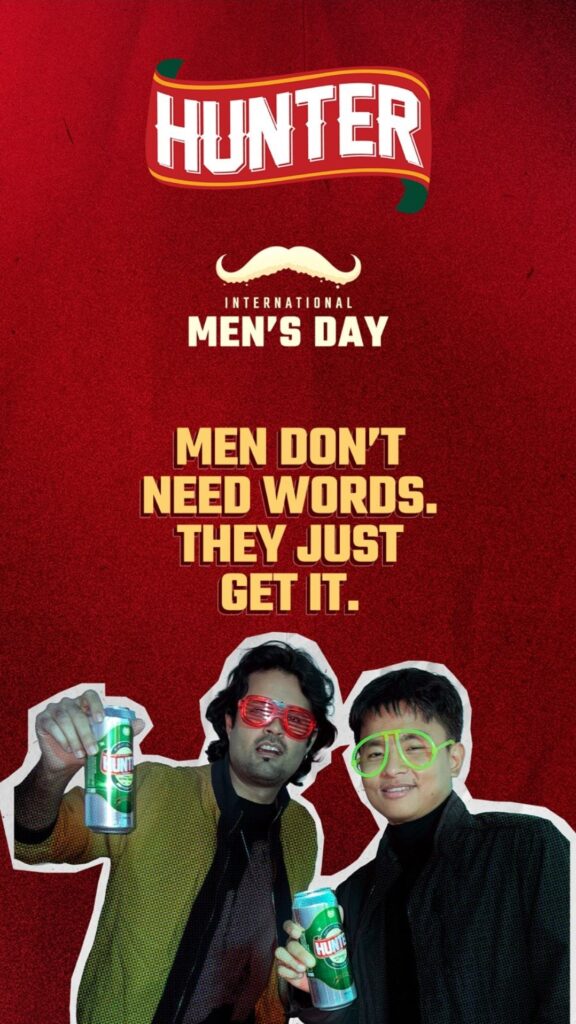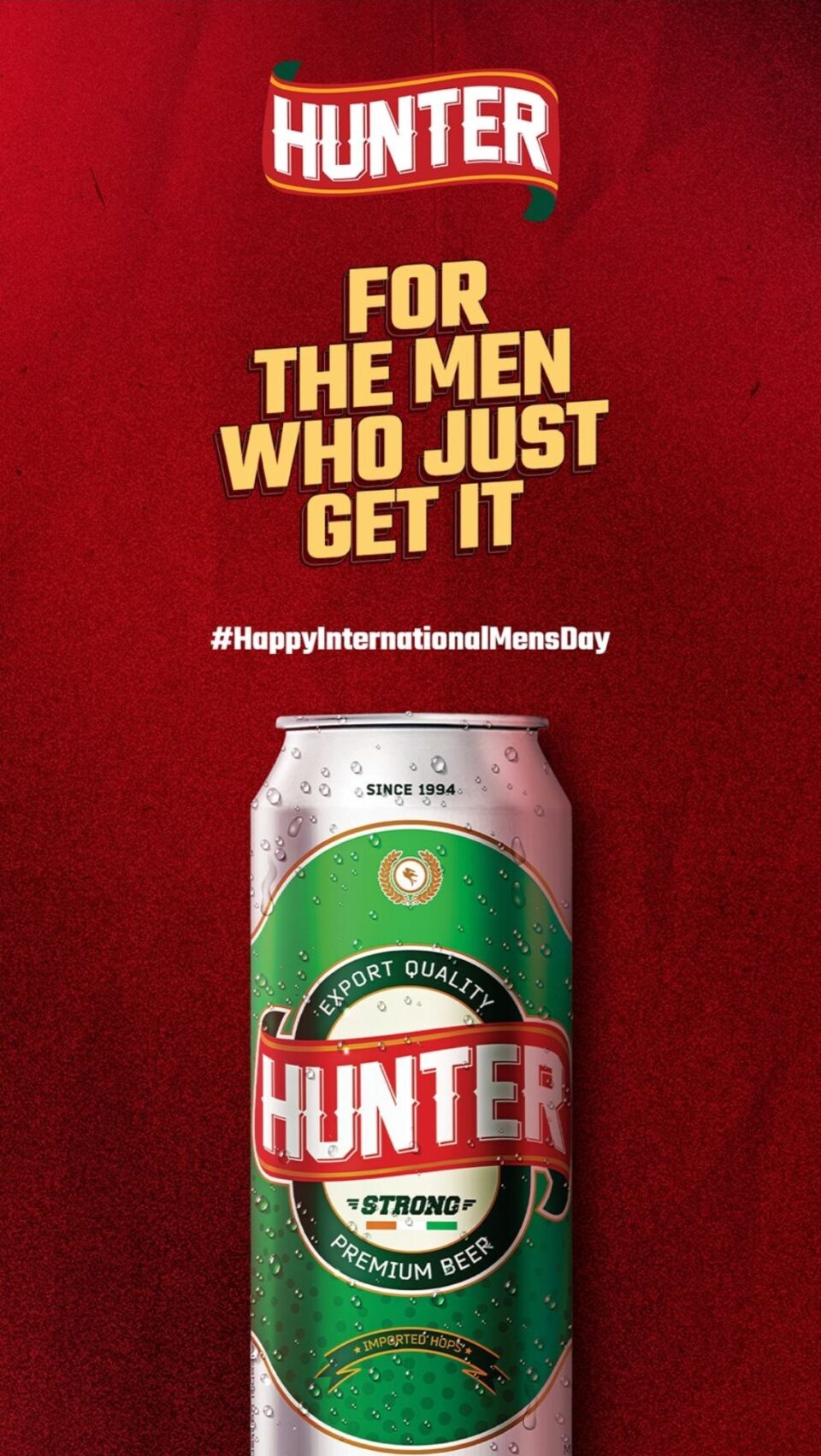Hunter’s ‘Men Don’t Need Words’ Campaign: Redefining Emotional CX Through Cultural Insight
Sometimes, the most powerful connections need no words. A half-smile, a shared glance, or a familiar phrase can convey what long speeches cannot. Hunter, the flagship strong beer from SOM Group, has harnessed that silent language of understanding in its new campaign, “Men Don’t Need Words – They Just Get It.” Celebrating International Men’s Day 2025, this campaign dives deep into an often-overlooked layer of male bonding — unspoken camaraderie.
While most beverage ads focus on exuberance and energy, Hunter’s approach moves inward, spotlighting a quiet emotional truth: men relate through gestures, humor, and shared moments, not always through explicit expression. It’s both a marketing move and a cultural lens into how modern brands can humanize their consumer experience.
The Unspoken Code: From Insight to Emotion
For decades, brands have portrayed masculinity through strength, success, and performance. But consumer sentiment has evolved. Men today value authenticity, emotional intelligence, and connection. Hunter’s new campaign taps this shift, turning a cultural insight into a compelling emotional experience.
As Lily Bagga, Chief Marketing Officer at SOM Distilleries & Breweries Ltd., explains, “We wanted to highlight something simple yet deeply meaningful — the way men connect and understand each other without saying much.” The core campaign line, ‘Chal Peene Chalte Hai,’ captures that instant emotional shorthand — a universal signal for celebration, consolation, or camaraderie.
This campaign doesn’t lecture or overcomplicate. Instead, it reflects an intuitive understanding: friendships thrive on shared moments, not formal gestures. That’s what makes the narrative resonate — it mirrors real life.
CX Strategy in Action: Simplicity, Relatability, and Cultural Context
At its heart, Hunter’s initiative represents a masterclass in emotional customer experience (CX). It transforms brand communication from a transaction into a cultural dialogue. Three strategic CX principles underpin the campaign’s strength:
- Simplicity as Connection
The campaign’s central idea — that communication doesn’t always need words — makes the experience effortless. When messaging mirrors natural human behavior, consumers feel seen, not sold to. The best CX strategies simplify rather than amplify. - Cultural Relevance as Emotional Currency
“Chal Peene Chalte Hai” is more than a catchphrase. It’s an emotion coded into everyday Indian life. By anchoring the campaign in colloquial behavior, Hunter turns culture into a customer engagement tool. This shared cultural shorthand enhances memorability and emotional recall. - Active Participation through UGC
The nationwide contest that invites users to share their funniest real-life “Chal Peene Chalte Hai” moments flips the focus from brand speaks to consumer participates. Social media calls to action, humorous reels, and relatable content create a co-authored experience. That’s modern CX in motion — participatory, personal, and purpose-driven.
The Psychology Behind “They Just Get It”
The strength of the campaign lies in understanding the psychology of connection. Hunter’s storyline is built around implicit communication — a fundamental behavioral pattern where emotions are conveyed without articulation. Research in consumer psychology supports that 90 percent of human decisions are emotional rather than rational. Silent understanding, like nods or gestures, triggers feelings of trust and belonging.
By aligning with these non-verbal cues, Hunter’s campaign mirrors how consumers naturally express affinity and loyalty — without fanfare. That emotional mirroring creates resonance, a powerful ingredient in brand recall and community loyalty.
Moreover, the campaign taps into collective nostalgia — the shared memory of friendships formed over after-work drinks or carefree college days. In CX terms, nostalgia acts as a bridge between experience and emotion, leading to deeper brand affection.
Storytelling That Mirrors Everyday Experience
Lyxel & Flamingo, the creative agency behind the campaign, translates this behavioral insight into relatable storytelling. Each reel, post, or video amplifies the real-world rhythm of men’s friendships — filled with inside jokes, wordless plans, and spontaneous understanding.
But what sets it apart is tone. It’s celebratory without being preachy. Humorous without being hollow. This balance positions Hunter not just as a beer brand but as a lifestyle companion, one that witnesses and celebrates life’s unfiltered moments.
Campaigns like this remind CX professionals that storytelling should not just speak to audiences — it should reflect them. When customers see their own lives mirrored authentically, brand engagement shifts from passive viewing to emotional ownership.
Experience by Design: Translating Emotion into Engagement
The “Men Don’t Need Words” campaign isn’t merely marketing; it’s experience design. Every element — from the contest mechanics to the digital amplification — aligns around the theme of effortless understanding.
Hunter’s integration of user-generated content, short-form humor reels, and interactive responses build a sense of inclusivity. Each participant becomes both storyteller and ambassador. This community-driven approach fosters micro-engagement loops, which modern CX strategies rely upon to build sustainable, long-term affinity.
The participation reward — exclusive Hunter merchandise — adds tangible value, but the bigger win lies in recognition. Sharing real-life stories allows users to reclaim a piece of their identity, laugh about it, and see it celebrated publicly. That emotional validation is priceless in the CX equation.
Male Emotionality in Brand Experience: A Deeper Shift
Historically, brands targeting male audiences leaned on tropes of toughness, independence, and competition. But the modern man’s experience is more layered. He values vulnerability as much as strength, connection as much as individuality. Hunter’s campaign steps into this cultural transition gracefully, redefining what male-oriented branding can look like in the contemporary experience economy.
From a CX lens, this evolution shows how emotional openness can be designed into brand ecosystems without diluting identity. In fact, it strengthens authenticity. By celebrating silent, shared experiences rather than loud declarations, Hunter invites men to feel — not just consume.
This approach also mirrors a broader cultural movement. Across categories, from apparel to technology, brands that lean into emotional authenticity outperform those that chase conventional masculinity. Emotional storytelling not only attracts attention but also builds trust — a cornerstone of effective experiential marketing.

Lessons for CX and EX Professionals
Hunter’s campaign offers rich takeaways that extend far beyond beverages. For those designing customer or employee experiences, three principles stand out:
- Design for Emotional Resonance, Not Just Recognition
Emotional truth engages more deeply than aesthetic appeal. Whether crafting a customer journey or internal campaign, ensure it reflects real emotional patterns. - Leverage Community Storytelling
When your audience becomes part of your story, engagement shifts from passive to co-creative. Empowering user contributions creates a sense of shared ownership. - Balance Humor with Humanity
Light, playful tones can deliver profound impact when grounded in empathy. People connect with authenticity, not perfection.
On the employee experience front, Hunter’s approach offers another layer of inspiration. Workplace culture also thrives when communication flows organically, without overexplanation. Creating spaces where teams “just get it” — where trust and understanding replace constant articulation — leads to stronger collaboration and emotional safety.
Much like Hunter’s portrayal of friendship, healthy EX is built on intuitive connection and shared purpose.
Why this Campaign Resonates Beyond Marketing
Great CX storytelling transcends product categories. Hunter’s campaign is a blueprint for culturally attuned, emotionally intelligent branding. It celebrates behavior, not aspiration. It spotlights inclusivity without forcing it. Above all, it converts everyday moments into brand moments, creating emotional stickiness that no ad jingle can replace.
For CX leaders, the insight is clear: modern consumers gravitate toward brands that understand rather than advertise. In an era where authenticity is scarce, understanding becomes the ultimate differentiator.
Hunter’s “Men Don’t Need Words – They Just Get It” embodies that truth beautifully. It tells men: you don’t have to explain who you are — we already get you.
And that’s perhaps the most elegant expression of experience design — when a brand doesn’t need words to connect, it simply feels understood.
Key Takeaways for CX/EX Leaders
- Emotional alignment beats promotional noise. Real storytelling that mirrors consumer behavior creates stronger loyalty.
- Human insight is the new competitive advantage. Campaigns built on behavioral truths outperform generic creative.
- Wordless connections are powerful. Simplified communication nurtures trust and belonging — essential for both CX and EX design.
- Culture-led branding builds credibility. Grounding narratives in authentic social insight enhances emotional recall.
- Participation sustains engagement. Inviting your audience to co-create keeps the experience alive beyond the campaign window.

